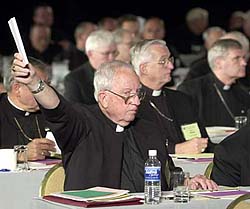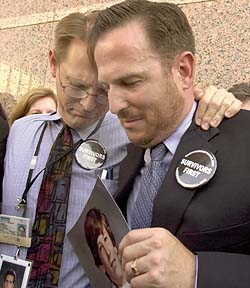First-time abusers would lose their job, but not be kicked out of priesthood
By Edward Walsh
Washington Post, carried in Detroit News
June 15, 2002
www.detnews.com/.../ 0206/15/religion-515574.htm
DALLAS -- The U.S. Conference of Catholic Bishops voted overwhelmingly
Friday to adopt a new national policy on the sexual abuse of minors by
priests that would remove all offenders from any job connected with the
church but would not necessarily force them out of the priesthood.
After a grueling day of debate, the bishops voted 239 to 13 to approve
the policy, a step that many of them have said they hope will begin to
repair the damage and the strain in their relations with Catholic laypeople
that has been caused by the unfolding sex abuse scandal within the priesthood.
 |
Bishop Walter F. Sullivan of Richmand, Va., holds up a ballot during the voting on the Charter for the Protection of Children and Young People at the U.S. Conference of Catholic Bishops' meeting in Dallas Friday. Eric Gay / Associated Press. |
"From this day forward, no one known to have sexually abused a child
will work in the Catholic Church," Bishop Wilton Gregory of Belleville,
Ill., president of the conference, declared after the vote. He added that
the bishops "apologize to anyone harmed by one of our priests and
for our tragically slow response in recognizing the horror of sexual abuse."
The Rev. Thomas Reese, editor of the Jesuit magazine America,
said the bishops backed away from the mandatory removal of abusive priests
because laicization -- the formal process of removing a priest -- is cumbersome
and time-consuming and such a provision might have been opposed by the
Vatican. He said there was also an argument that it could be more dangerous
for children if an abusive priest was forced out of the priesthood and
was then no longer monitored by church authorities.
Under the new policy, such a priest will be taken out of public ministry
and sent "to lead a life of prayer and penance."
"We may in fact be protecting the community by keeping him under
church supervision," Reese said.
That argument did not satisfy members of victims groups. "It isn't
zero tolerance," said Peter Isely, a member of the Survivors Newtrork
of Those Abused by Priests (SNAP). "It is simply not what Catholics
wanted."
David Clohessy, SNAP's national director, said the bishops "look
at these men as priests first and sexual predators last. They've got it
backwards."
 |
Mark Serrano, right, and David Clohessy, both members of Survivors Network of Those Abused by Priests, comfort each other after speaking to the media in Dallas Friday. SNAP is speaking against the changes the Bishops are making in their clerical sex abuse policy. L.M. Otero / Associated Press. |
But the bishops insisted that by removing all priests guilty of even
a single instance of sexually abusing a minor from parish work or other
public ministries, they accomplished the most important goal of protecting
children. Some, such as Cardinal Theodore McCarrick of Washington, also
said that virtually all priests who sexually abuse children are also likely
to be ousted from the priesthood by laicization.
"I understand that there are severe and raw emotions," said
the Rev. Joseph Galante, the coadjutor bishop of Dallas. "But I think
we have done what our people want us to do, which is to remove from public
ministry and access to priestly identity those who have offended."
The vote Friday afternoon, cast on paper ballots that the bishops signed,
climaxed an intense two days for the clergymen. They are under immense
pressure to respond to a sex abuse scandal that Gregory has called perhaps
the gravest crisis ever faced by the church in the United States.
In the end, the bishops adopted a compromise that was an attempt to satisfy
widespread demands for zero tolerance of even a single act of sexual abuse
of a minor, but that stopped short of mandating that priests who abuse
minors be removed from the priesthood as well as their ministries.
"Diocesan policy will provide that for even a single act of sexual
abuse of a minor -- past, present or future -- the offending priest or
deacon will be permanently removed from ministry," the new policy
declared.
This was a key issue during the conference and one that clearly troubled
many of the bishops. Under it, any priest known to have sexually abused
a minor in the past and who is still active in a diocese would be forced
to leave his ministry.
That provision confronted the bishops with the painful prospect of removing
priests they know from their ministries and some of the bishops said they
opposed such an approach.
Bishop Howard Hubbard of Albany, N.Y., said the bishops conference was
proposing "a simplistic solution to a complex problem" and a
"one-size-fits-all approach."
"I think this is seriously flawed," said former Bishop Francis
Hurley of Anchorage. "I think we are very defective and have left
ourselves open to the charge that we sound like legislators, getting a
quick fix."
Bishop Joseph Sullivan of Brooklyn also faulted the bishops for not doing
more to acknowledge their own responsibility for the sex abuse scandal.
"The reality is that we were blind," he said. "We were
so cowered by the fear of scandal that we did not see the problem.
But by Friday's debate there was a clear consensus in the bishops conference
for what they characterized as a zero tolerance policy. "One act
of abuse is one too many," said Cardinal William Keeler of Baltimore.
"Most often it's not just one, it's more than one."
"I hate to say I support zero tolerance," added Cardinal Anthony
Bevilacqua of Philadelphia. "But we must place the good of the church
first." The policy also declared that cases of sexual abuse of a
minor may result in "a request for laicization even without the consent
of the cleric." Earlier versions of the policy, which was extensively
amended during closed meetings Thursday, said that any future act of sexual
abuse of a minor by a priest would result in his automatic removal from
the priesthood.
The new policy also established a review board that will monitor implementation
of the policy and dioceses across the country. Gregory announced that
the board will be headed by Gov. Frank Keating of Oklahoma (R) and that
Robert Bennett, a Washington lawyer who represented former president Clinton
in the sexual harassment suit filed against him by Paula Jones, had also
agreed to serve on it.
The bishops also voted to submit the policy to the Vatican and will ask
church officials in Rome to make it mandatory law for the U.S. church.
But the bishops said they did not expect there to be any resistance to
applying the policy immediately.
Bishop George Niederauer of Salt Lake City said that the review board
will be urged to publish a list of any dioceses that are not adhering
to the policy. "I don't think any of us want to be on the list."
The process of debating and amending the policy at Friday's meeting unfolded
slowly as the bishops often haggled over the addition or deletion of a
single word. In general, the bishops turned back attempts to weaken the
policy. For example, they rejected an amendment to have it apply only
to "credible" accusations of sexual abuse.
As the meeting dragged on, Gregory provoked the first applause when he
suggested that he would begin limiting debate.
"When push comes to shove we tend to fall back into a scholastic
mode," Galante said of the tone of the meeting. "We all studied
theology; we all studied philosophy. Good philosophers make distinctions.
But we're not doing theology here. We are doing a position document to
protect children."
Highlights of Policy [Sidebar]
Highlights of national policy on disciplining priests approved Friday
by the U.S. Conference of Catholic Bishops:
-- Bars priests who commit sexual abuse from parish work and all public
ministry.
-- Allows bishops, acting on the advice of an advisory board comprised
mainly of lay people, to decide whether to oust abusive clergy from the
priesthood.
-- Bishops must report all allegations of abuse of minors to civil authorities.
-- Bishops should no longer make confidentiality agreements in settlements
of civil lawsuits over sex abuse unless the victim insists.
-- Requires background checks for all diocesan and parish workers who
have contact with children.
-- Requires bishops to provide an "accurate and complete" description
of a priest's personnel record if the cleric seeks to transfer to another
diocese.
-- Creates a commission to research how the U.S. church has responded
to sex abuse by priests.
-- Creates a national Office of Child and Youth Protection in the U.S.
Conference of Catholic Bishops to implement "safe environment"
programs and take other actions to protect children from abuse.
-- Creates a review board, including parents, to work with the Child Protection
Office to annually examine how the bishops are responding to abuse.
-- Has dioceses establish an outreach program to support victims of priestly
sexual abuse.
-- Associated Press
CyberSurvey
New Catholic policy
The new national policy on the sexual abuse of minors by priests would remove all offenders from any job connected with the church but would not immediately force them out of the priesthood. Are you satisfied with the new policy?
Any original material on these pages is copyright © BishopAccountability.org 2004. Reproduce freely with attribution.